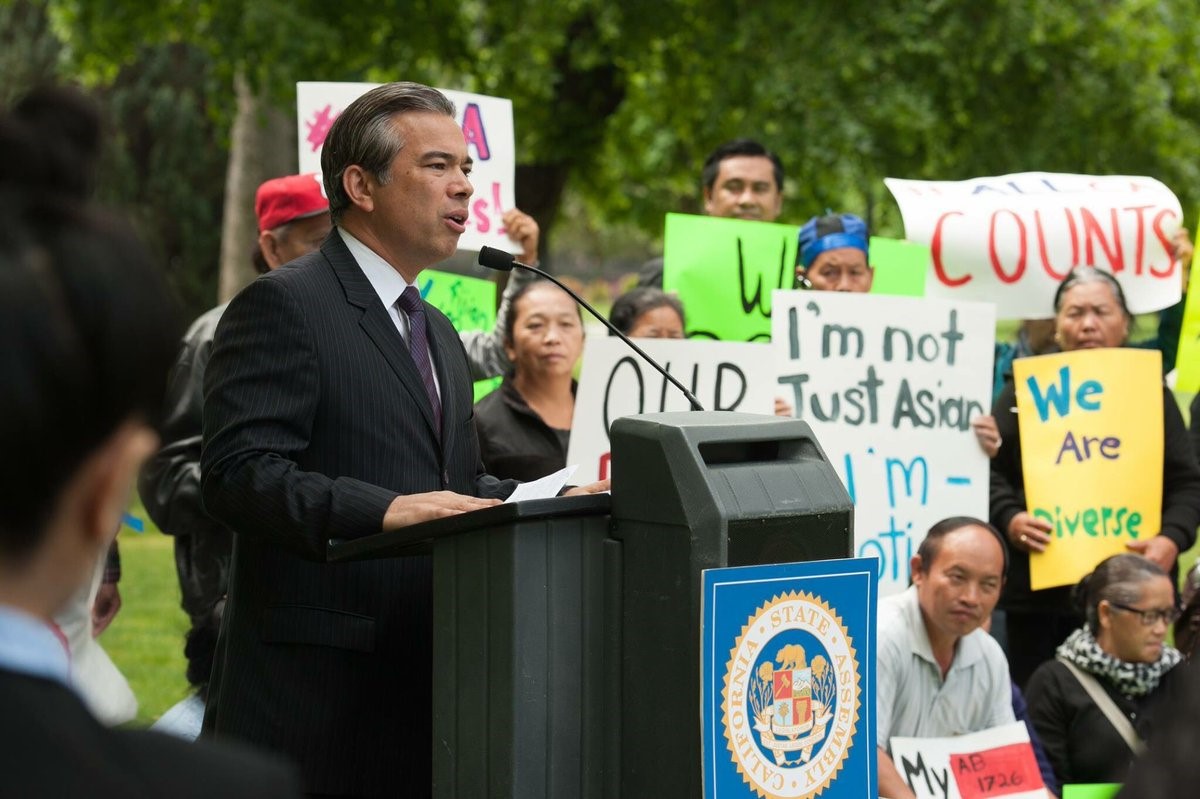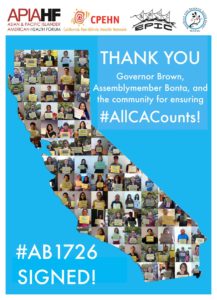
Following years of tireless advocacy work by AAPI advocacy groups, California has signed a critical data disaggregation bill into law.
AB1726 (also called “The AHEAD Act”) was introduced before the California Legislature early this year by bill author Assemblyman Rob Bonta. Recognizing that most state and federal data generally lump all members of the nearly 50 ethnic groups that comprise the AAPI community into a single monolithic category or disaggregate by only a handful of ethnic identifiers, the bill called for the expanded disaggregation of state public health and higher education data to include at least ten more ethnic categories for AAPIs. Those new ethnic options — which include checkboxes for those who identify as Bangladeshi, Hmong, Indonesian, Malaysian, Pakistani, Sri Lankan, Taiwanese, Thai, Fijian and Tongan — were consistent with what is currently available via the National Census.
Meanwhile, the lack of disaggregated data renders invisible several achievement disparities — including increased incidence of certain treatable diseases and/or reduced education access — that disproportionately impact certain AAPI ethnic groups over others. Without the capacity to draw awareness to those inequities, no culturally- or linguistically-specific resources are devoted to addressing them.
The AHEAD Act was designed to take the first step towards helping the thousands of Asian American and Pacific Islander Californians who are currently underserved by state and federal services.
 The AHEAD Act was the second iteration of an earlier data disaggregation bill that had passed the California Legislature with near unanimous support in 2015; that bill was inexplicably vetoed by Governor Jerry Brown last year. This year’s AB1726 emerged out of discussion between AAPI advocates — including Assemblyman Bonta, as well as groups such as SEARAC, APIAHF, CPEHN and EPIC — and the governor’s office in hopes that a new version of the bill could be drafted that might satisfy the concerns of all parties.
The AHEAD Act was the second iteration of an earlier data disaggregation bill that had passed the California Legislature with near unanimous support in 2015; that bill was inexplicably vetoed by Governor Jerry Brown last year. This year’s AB1726 emerged out of discussion between AAPI advocates — including Assemblyman Bonta, as well as groups such as SEARAC, APIAHF, CPEHN and EPIC — and the governor’s office in hopes that a new version of the bill could be drafted that might satisfy the concerns of all parties.
Upon introduction, AB1726 immediately garnered the same strong multiracial and bipartisan support as earlier attempts. 120 California-area organizations formally supported the bill, as did 35 national AAPI organizations who are associated with the National Council of Asian Pacific Americans network; Chinese for Affirmative Action also offered their approval of the bill. The bill was also strongly supported by the entities that oversee California’s colleges and universities, who were among those who would be required to implement the bill’s new mandates.
However, Asian American opponents of affirmative action launched a confounding effort to oppose AB1726, arguing that AB1726 was a “backdoor” to affirmative action in the state. Organizing predominantly through Chinese-language social media outlets such as WeChat, opponents staged rallies and published memes calling the bill “racist” and likening it to the early days of Germany’s Holocaust. Republican California State Senator Bob Huff lead the charge against AB1726, and the bill also received dubious opposition from Ro Khanna, a Democrat running to unseat Representative Mike Honda.
The arguments against AB1726 were baffling; I still struggle to understand how data disaggregation could be a controversial topic, and I, moreover, fail to see how the AHEAD Act is anything like Chinese Exclusion, Japanese American incarceration, or German concentration camps. Nonetheless, the AHEAD Act was amended earlier this summer to remove official requirements on California’s collection of higher education data.
The amended AHEAD Act, which focuses now primarily on the collection of public health data, passed both the California State Senate and the California Assembly in late August, with only a single nay vote recorded against the bill across both floor votes. Even former opponent State Senator Huff cast a vote to approve the measure. But, it was still possible that Governor Brown might again veto the bill.
Those fears were allayed over the weekend when AB1726 was among over thirty bills signed into law by Governor Brown.
Thanks @JerryBrownGov for signing my #AB1726, the AHEAD Act to open up health data for many more API Communities. #AllCaliforniansCount
— Rob Bonta (@RobBonta) September 26, 2016
This, alone, is a victory. But in addition, there is evidence that California’s colleges and universities — in recognition of the importance of ethnically disaggregated AAPI data — will work with bill authors to voluntarily collect more nuanced and illuminating data regarding Asian American and Pacific Islanders, even though the bill was amended to remove their mandate that they do so. Writes AHEAD Act author Assemblymember Rob Bonta in his Facebook post reacting to the bill’s signing:
We received great news today– Governor Brown signed my AHEAD Act (AB 1726) which provides for Asian Pacific Islander (API) disaggregated data! The AHEAD Act addresses a very important need within our API communities. Many ethnic subgroups within the API community are falling behind with respect to health outcomes and our policy makers haven’t had detailed, accurate data to address these disparities. AB 1726 requires the state health department to disaggregate data for specified ethnic subgroups. The data to be collected by AB 1726 will give the state a better understanding of the needs of each of these API subgroups. And in addition, UC and CSU, working closely with our office, have committed to releasing disaggregated educational data they are collecting to help us understand API admissions, completion, and graduation rates. I strongly believe that having good data will help us create better policy, and help us uplift ALL of our API communities! Thanks for everyone’s support on this!
This blog wants to thank all the many activists and elected officials who courageously invested their time and energy into helping the many underserved and struggling Asian Americans and Pacific Islanders who too often languish, invisible and unheard. Passage of AB1726 brings California a step closer to ensuring that all Californians — and particularly, all AAPI Californians — finally count.
